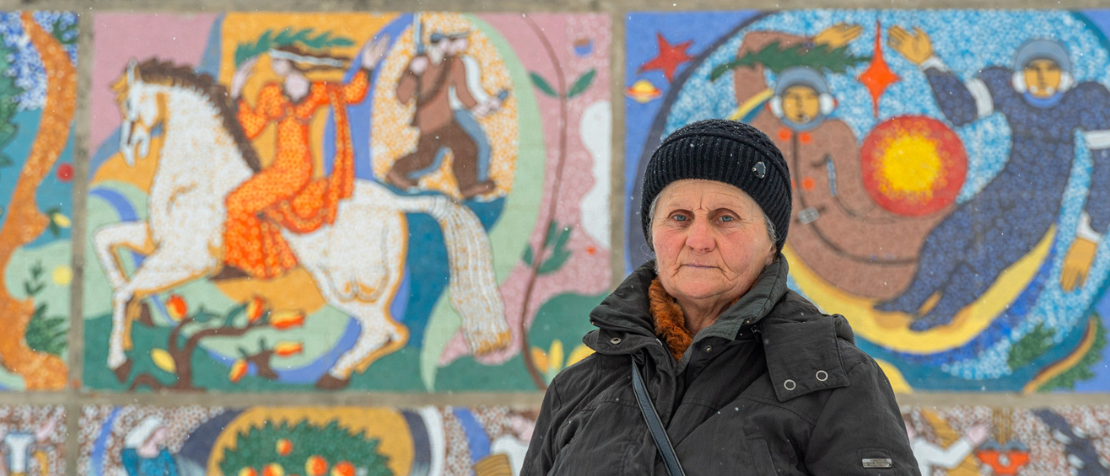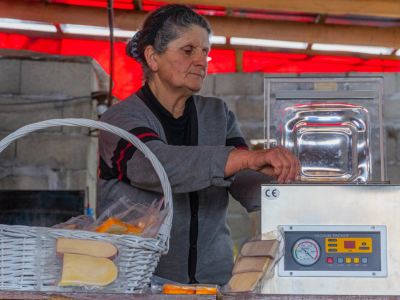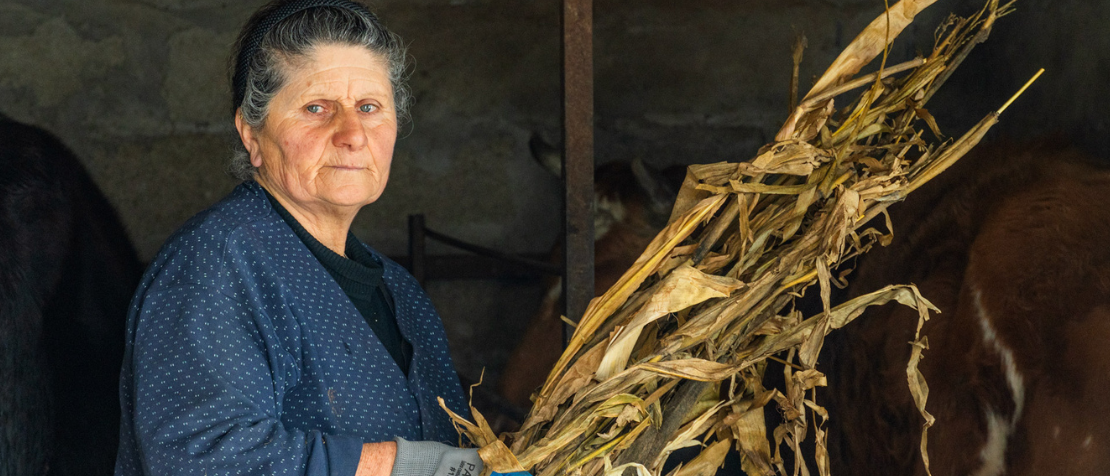
Smallholder woman farmer flourishing with innovative cheesemaking and modern dairy production practices in Georgia
World Food Safety Day (7 June) sheds spotlight on the importance of food safety standards
FAO/Guram Saqvarelidze
06/06/2025
Amidst the citrus trees, cows crossing the streets and hazelnut orchards, a typical sight in the Samegrelo-Upper Svaneti region, Marina Kacharava, 69, is pursuing her passion of making high-value European cheeses in her small farm next to her home in the town of Abasha. In the region, she is one of the most successful students of a Farmer Field School (FFS) run by the Food and Agriculture Organization of the United Nations (FAO). Farmer Field Schools include a facilitated training curriculum, a learning-by-doing approach and farmer-to-farmer learning principles. Facilitated by FAO, the training is made possible through a Swiss Agency for Development and Cooperation (SDC) project, implemented in partnership with UN Women, as well as the European Union (EU) and Sweden under the European Neighbourhood Program for Agriculture and Rural Development (ENPARD) IV programme.
Through the Farmer Field School, Marina has been fully trained in modern dairy farming practices and innovative production methods as well as in relevant food safety standards. Ahead of World Food Safety Day (7 June), her story demonstrates the importance and potential of applying food safety standards in all stages of the food processing and production process.
From milking methods to feeding and animal care, she has significantly improved her approach to primary production in dairy farming. Educational modules about gender equality, organized by UN Women, and commercialization of cheese production have given her the confidence to further expand from beyond selling at the local bazaar, to connecting with the hospitality and retail sectors, and to customers in Georgia’s major cities.
“I got interested in the training opportunities as soon as I heard about FAO a few years ago in Abasha,” Marina remembers. “I made sure to find time to join each FAO training at the Farmer Field School.”
Before the FFS, “I did not know much about many aspects of animal care practices that the FAO veterinarians and food technologists taught me in the Farmer Field School,” Marina recalls. “I have changed my animal husbandry, hygiene and milking practices accordingly.”
The SDC-funded project, which was implemented in partnership with UN Women, has supported 615 smallholder dairy women farmers in 30 Farmer Field Schools in the Samegrelo-Upper Svaneti region during the past four years with knowledge-exchange opportunities. Now they are equipped with the skills, experience, and knowledge necessary to comply with improved food safety standards, as well as enhancing their production of higher-quality dairy products in larger quantities.
Good hygiene at every step
Marina highlights the usefulness of pre-milking practices. “Bacteria accumulate in cows’ udder teats and disposing of the initial few streams of milk before proceeding to collecting milk for consumption and production.” Marina also points out the importance of the deworming methods that come in handy in ensuring the health of her cows.
“I have also modified my feeding practices,” Marina says, “I learned how to feed my cows better, and this has resulted in higher productivity. I now produce more milk, and make higher-quality cheese, which creates more income for me.”
Along with sharing knowledge, FAO, through the support of the Swiss Agency for Development and Cooperation, provided Marina with small equipment and tools, such as a mill to grind feed for her cows, animal care items, a vacuum sealer, and cheesemaking utensils. As a result, she has been able to further improve her production efficiency, quality and hygiene standards, while saving time and costs and increasing the quality of her products. Most importantly, she utilizes this equipment and tools for demonstrating the benefits of their use to other dairy farmers in her community.
Expanding the cheese portfolio
Marina presents her traditional dairy products such as Imeretian and Sulguni cheese in the local bazaar and prides herself for selling her dairy goods for the highest prices available on the market.
“In addition, FAO taught me how to make French, Dutch, Italian, and Bulgarian cheese types,” she proudly points out, “and now I also produce cheese for grilling and cream cheese.” Now, she offers her new European style cheeses to the local consumers.
“A woman came by and was shocked to see European aged cheese in the Abasha bazaar,” she remembers, “she took down my number, bought some of my products and asked me to send her such cheeses to Batumi, where she is from.”


FAO/Guram Saqvarelidze
“I exhibit my innovative cheeses at the farmers’ markets in Batumi, Tbilisi, and Kutaisi,” she says, “the quality and taste of my products are what attract customers during such events. This is where I sell most of the new cheese varieties,” Marina points out, “since there is big demand in the cities. In some cases, I have even bought milk from other farmers to make sure that I have enough cheese so that I do not run out before the agromarket is over.”
Organized by FAO through the support of the European Union and Sweden, the Unique Georgian Taste agromarkets have transformed into the main platforms for selling such products as Marina’s, and as a platform for farmers and producers to connect with new customers and, restaurants, boutique shops and hotels interested in trying out local and innovative foods.

FAO/Guram Saqvarelidze
As a result of the SDC-supported FAO project, the women farmers involved in the training sessions have reported an average of 78 percent increase in milk production. They are selling their cheeses from 60 to 250 percent higher prices, compared to traditional cheeses, and report a 155 percent rise in income.
FAO continues to empower Georgian dairy farmers, the majority of whom are women, in the Samegrelo-Upper Svaneti and other regions. Through the support of SDC, as well as under the European Union and Sweden-funded ENPARD IV, FAO is expanding the network of Farmer Field Schools, training hundreds of women, and promoting local production through the Unique Georgian Taste agromarkets.
Marina continues her small-scale dairy farming efforts in Abasha. With the knowledge about safe and improved production as well as commercialization of her agricultural goods, she is ever more ready to proudly continue showcasing traditional and innovative dairy products in Abasha, as well as beyond it, including in larger cities of Georgia.
“I am impressed with what I managed to do and very proud of my cheese,” says Marina, “and I am very thankful to FAO for this opportunity. I only needed some help and guidance and now, I am not going to stop here.”
World Food Safety Day
Food safety saves lives. It is not only a crucial component to food security, but it also plays a vital role in reducing foodborne diseases. Every year, 7 June – World Food Safety Day – reminds us of the crucial role of food safety, demonstrating how to prevent illnesses, and helps promote knowledge and awareness on food safety solutions, and good practices along the food chain.
